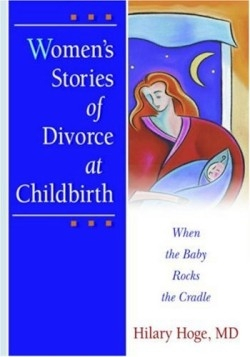Women's Stories of Divorce at Childbirth
When the Baby Rocks the Cradle
Divorce is often more painful than loss of a spouse through death, according to the author, because divorce usually entails rejection while death rarely does. For women with children, mourning the loss of a husband who splits can be difficult because he remains present as a father. The child whose parent has died is encouraged to grieve and emulate the lost parent, but not so after divorce if a nasty standoff exists, and the child reminds each parent of a bitter rival. Hoge, a psychotherapist, brings clinical experience, in-depth knowledge of the literature, and an original research study to bear on these issues, and comes up with ideas—and some answers—that make this book a touchstone in a controversial field.
Divorce, though decreasing from near half of U.S. marriages to close to forty percent, is a subject as difficult as it is distressing. Hoge interviewed seventeen women in the unusual circumstance of divorce within a year of childbirth. In ten cases, husbands initiated separation; in most of the others, wives were driven to separate by abusive treatment. The author did not interview husbands, and acknowledges a possible bias, but her desire to understand rather then blame rings true. She alternates well-told case histories (identities disguised) with clear, salient discussion of theory and research. This admittedly atypical group offers a clear and painful look at an interlocked series of human events: courtship, marriage, birth, conflict, divorce, trauma, grief, resilience, struggle, and resolution. This book proves that extreme situations well-examined contribute greatly to an understanding of the vast middle ground where most people live.
Hoge points out that there is no clear cultural ideal of motherhood: “Women may find it difficult to integrate messages encouraging them to celebrate independence, career, slimness, and romance with those celebrating selfless dedication to motherhood. It is hard to be all things at once.” It takes longer than was formerly thought to recover from divorce: four years and more. Hoge summarizes psychoanalytic theories (Freud, Klein, Bowlby, Erikson, Spence) and the recent, contrasting divorce studies by Judith Wallerstein and Mavis Hetherington. She believes that divorce can be a positive factor for children whose parents’ marriage was full of strife, given three outcomes: the conflict lessens, the parents/caretakers have good mental health, and there is financial stability. In short, negative outcomes are understandably common but not inevitable. Hilary Hoge’s gripping tales and cogent comments will reward general readers as well as clinicians and researchers, and may become a staple in sociology and family studies courses.
Reviewed by
E. James Lieberman
Disclosure: This article is not an endorsement, but a review. The publisher of this book provided free copies of the book to have their book reviewed by a professional reviewer. No fee was paid by the publisher for this review. Foreword Reviews only recommends books that we love. Foreword Magazine, Inc. is disclosing this in accordance with the Federal Trade Commission’s 16 CFR, Part 255.

